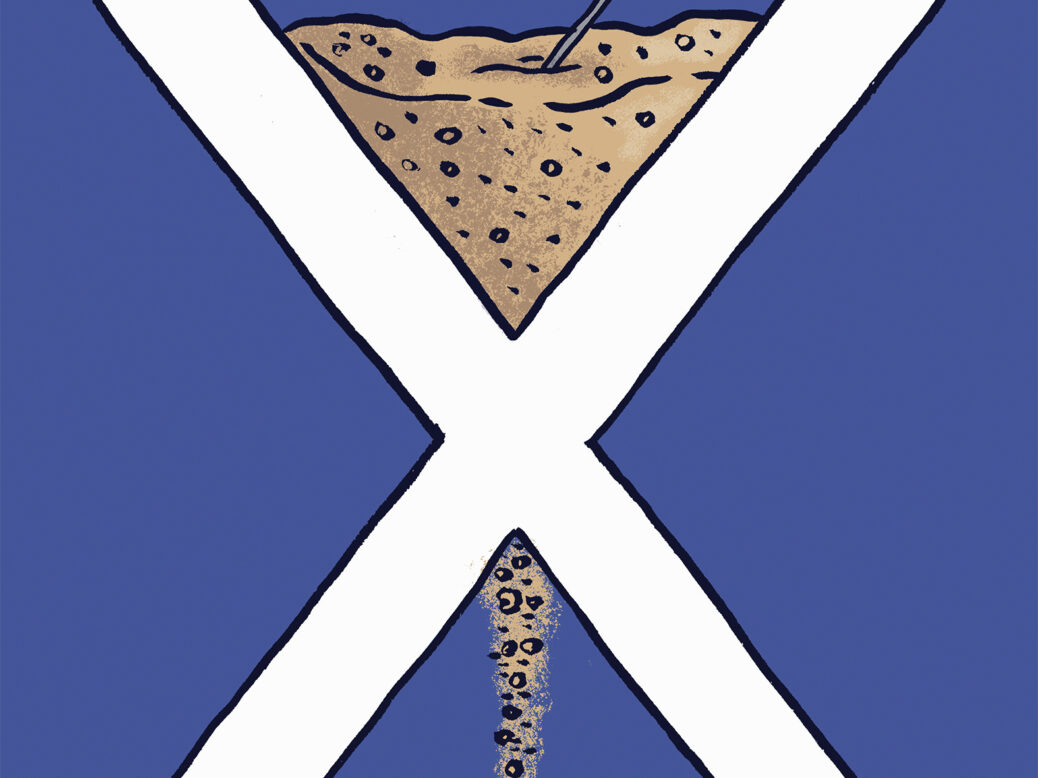
At least Joe Biden brought a present. It may have resembled a soup bowl from Sainsbury’s posh Artisan range – he couldn’t afford the set? – but it was a reasonable thought. When it’s as cold out as it is, we Scots consume a lot of broth.
Typically, Boris Johnson came to Glasgow’s Cop26 soiree empty-handed, the Prime Minister being the kind of guy who would arrive at your party with a few cans of Tennent’s in a plastic bag and then drink the decent wine brought by others.
There is anyway a clear lack of respect for his regional host. The UK government appears to have done everything in its power to ensure Nicola Sturgeon has been allowed only the most peripheral of roles at Cop. This even stretched to the one joint event in Glasgow – a breakfast reception that the Scottish government said was co-hosted by Johnson, Sturgeon and the Welsh and Northern Irish First Ministers. Not so, said Downing Street: Johnson would merely “drop in”. That “co-hosted” clearly gave Downing Street the heaves, with its tiny suggestion of equivalence.
Sturgeon has always been enjoyably frank about her relationships with British prime ministers. She got along well enough with David Cameron, but has had a pretty bad run since then. She once laughingly described a meeting with Theresa May to me: “I remember just after May came back from America, when she’d held Trump’s hand, she’d also been to Turkey and somewhere else. This was the Monday morning. We sit down, it’s literally just the two of us, and I say, ‘You must be knackered.’ She said, ‘No! I’m fine!’ And it was as if I’d insulted her. It was just impossible to get any human connection.”
Matters have not improved with Johnson, to the extent that she used a recent interview with Vogue to chide his “fragile male ego”: “He seems to have a disinclination to be, metaphorically speaking, in the same room as me. It’s odd.”
It’s understandable, of course, that Conservative leaders view Sturgeon and her party with deep suspicion. After all, the Tories are the self-declared party of the Union and the SNP is the opposite. The two are locked in battle over whether Scotland should be allowed to hold a second independence referendum that could break apart the United Kingdom. But Sturgeon is also the elected First Minister of devolved Scotland, chosen both by pro-independence voters and a reasonable chunk who are pro-UK but see her as the best national leader on offer. She governs for all Scots, making the policies and the laws that govern most aspects of our daily lives, and is transparently a civil and humane woman. And even if you don’t like the individual, try to show some respect for the office.
But this is probably asking too much of a government run by the current inhabitant of 10 Downing Street. After all, Johnson shows no respect for his own office. He has repeatedly displayed a Trump-flavoured contempt for the norms and behaviours that, historically, have effectively and efficiently regulated British politics. Playing “World King” in his head, he does not adhere to rules made, as he sees it, by little people for little people. Johnson does what he wants, when he wants.
A fish rots from the head down, and this blithe dismissal of boundaries has slowly infected the rest of the Conservative Party. Its behaviour this week concerning Owen Paterson, the former cabinet minister found to have breached lobbying rules, has made a mockery of parliament. It is this contemptuous approach to any form of accountability in public life that defines the Johnson era more than anything else. Treating Sturgeon like a pariah is just one more caustic Etonian sneer.
[See also: Boris Johnson faces Tory backlash after U-turn in Owen Paterson sleaze row]
But it also risks being self-defeating, by rotting the Union from the inside. Scotland may not be ready to vote for independence tomorrow, but even among many unionists there is a discomfort with the current condition of Britain and their place within it. Brexit is a cognitive dissonance that they struggle to reconcile. Westminster often appears unutterably alien in its personnel and its choices. The public school infighting and backbiting that characterised the cabinet throughout the Covid nightmare horrified Scots – they may have their gripes with Sturgeon and her administration, but by comparison the latter were disciplined, focused and united amid the greatest public health crisis for a century.
It all amounts to a Union that is profoundly uncomfortable in its own skin, its constituent parts unable to rub along and show much fellow feeling. There are countries across the world where national leaders must work with their sub-state politicians, and do so constructively and maturely. In the UK the two seem on a constant war footing. The relationship is more often zero-sum, a game of one-upmanship, snitty briefings and more or less open denigration.
There’s no doubt the SNP bears some responsibility for this, as it works to gain every constitutional advantage, but one can at least argue that Westminster need not respond in kind. As the mother parliament – literally the legal superior of Holyrood – it ill-befits the place to treat the nations that make up the UK like irritating children who should either be placed on the naughty step or shut in their rooms. It only breeds resentment.
If the Union is to have a future, we must find ways of living, working and deciding together that enable us all to enjoy degrees of satisfaction, representation and ownership. The chaotic, egocentric iconoclasm of Boris Johnson will never appeal to Scots, but at some point the UK must find a PM who can speak for – and indeed to – us all.
[See also: Why climate activists should support the bin strikes marring Cop26’s elite spectacle]





